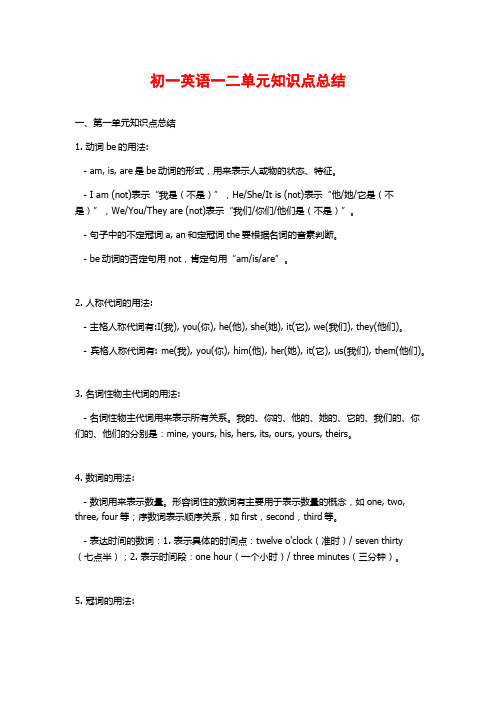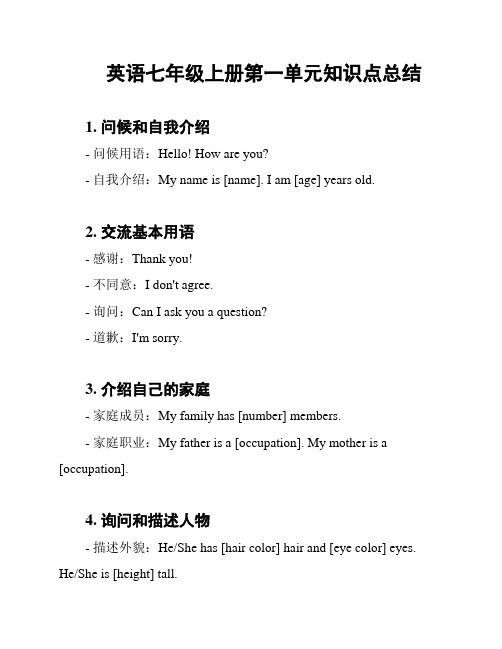英语第一单元知识点总结
初一英语一二单元知识点总结

初一英语一二单元知识点总结一、第一单元知识点总结1. 动词be的用法:- am, is, are是be动词的形式,用来表示人或物的状态、特征。
- I am (not)表示“我是(不是)”,He/She/It is (not)表示“他/她/它是(不是)”,We/You/They are (not)表示“我们/你们/他们是(不是)”。
- 句子中的不定冠词a, an和定冠词the要根据名词的音素判断。
- be动词的否定句用not,肯定句用“am/is/are”。
2. 人称代词的用法:- 主格人称代词有:I(我), you(你), he(他), she(她), it(它), we(我们), they(他们)。
- 宾格人称代词有: me(我), you(你), him(他), her(她), it(它), us(我们), them(他们)。
3. 名词性物主代词的用法:- 名词性物主代词用来表示所有关系。
我的、你的、他的、她的、它的、我们的、你们的、他们的分别是:mine, yours, his, hers, its, ours, yours, theirs。
4. 数词的用法:- 数词用来表示数量。
形容词性的数词有主要用于表示数量的概念,如one, two, three, four等;序数词表示顺序关系,如first,second,third等。
- 表达时间的数词:1. 表示具体的时间点:twelve o'clock(准时)/ seven thirty(七点半);2. 表示时间段:one hour(一个小时)/ three minutes(三分钟)。
5. 冠词的用法:- 不定冠词a/an的用法:a用于以辅音音似开头的单词前,an用于以元音音似开头的单词前。
- 定冠词the的用法:指特指的人或物。
二、第二单元知识点总结1. 人称代词的宾格形式:- 单数形式:me(我)、you(你/你们)、him(他)、her(她)、it(它);- 复数形式:us(我们)、you(你们)、them(他们)。
英语第一单元知识点梳理

Unit 1 My school
1.重点单词,会读会认会默写:first floor , second floor , teachers’ office , library , playground , computer room, art room , music room .
2.基数词变序数词的口诀:基变序,有规律,词尾加上th,一二三,特殊记,词尾字母tdd.
one→first two→second three→third
在几楼,用方位介词on : 在一楼on the first floor
在二楼on the second floor 在三楼on the third floor
3.library 的复数是libraries
4.提问:Is this / that ...? 这是/那是....吗?
回答:Yes, it is. / No , it isn’t.
5.提问:Where is ....? ....在哪里?回答方位介词。
6.介绍人或物,用This is +人/物.
7.Here is / are +人/物. 意思是:这是.....
8.人称代词变物主代词:we 我们→our 我们的
9.How many +可数名词复数+are there ? 回答数字。
10.礼貌用语:This way, please. 请走这边/这边请。
11.提问:Do you have ....? 你/你们有....吗?
回答:Yes, I/we do. No, I/we don’t.
12.感叹句:How +形容词!意思是:多么....啊!
13. I like +可数名词复数. 意思是:我喜欢....。
高中英语必修一第一单元知识点

高中英语必修一第一单元知识点一、词汇与短语1. 词汇- 基础词汇:问候、介绍、数字、颜色、职业、日常用品等。
- 扩展词汇:描述人物特征、表达喜好、日常活动相关词汇。
2. 短语- 问候用语:Hello, Hi, Good morning/afternoon/evening.- 自我介绍:My name is..., I come from..., I am...- 询问与回答:What's your name?, How old are you?, Where do you come from?- 表达喜好:I like/don't like..., I'm interested in..., My favorite...二、语法1. 时态- 一般现在时:表示经常发生的动作或状态。
- 一般过去时:表示过去发生的动作或状态。
2. 句型- 肯定句、否定句和疑问句的构成。
- 特殊疑问句的构成:Who, What, Where, When, Why, How。
3. 代词- 人称代词主格和宾格的使用。
- 物主代词形容词性和名词性的区别。
4. 介词- 常用介词:in, on, at, for, with, by, of, about, from, to, from...to...三、听力与口语1. 听力- 理解日常对话和短文。
- 抓住关键信息,如人名、地点、时间和数字。
2. 口语- 进行简单的自我介绍和日常对话。
- 描述人物和事物,表达个人意见和喜好。
四、阅读与写作1. 阅读- 阅读并理解简短的文章和对话。
- 通过上下文猜测生词的意思。
2. 写作- 写简短的自我介绍。
- 描述人物、地点或事件。
五、文化知识1. 了解英语国家的基本文化习俗。
2. 学习与日常生活相关的英语国家节日和传统。
六、学习策略1. 制定学习计划,合理安排学习时间。
2. 利用多种资源和工具辅助学习,如词典、录音和在线资源。
英语七年级上册第一单元知识点总结

英语七年级上册第一单元知识点总结1. 问候和自我介绍- 问候用语:Hello! How are you?- 自我介绍:My name is [name]. I am [age] years old.2. 交流基本用语- 感谢:Thank you!- 不同意:I don't agree.- 询问:Can I ask you a question?- 道歉:I'm sorry.3. 介绍自己的家庭- 家庭成员:My family has [number] members.- 家庭职业:My father is a [occupation]. My mother is a [occupation].4. 询问和描述人物- 描述外貌:He/She has [hair color] hair and [eye color] eyes. He/She is [height] tall.- 描述个性:He/She is [personality trait], [personality trait], and [personality trait].5. 数字和年龄- 数字:0-10是 zero, one, two, three, four, five, six, seven, eight, nine, ten.- 年龄:I am [age] years old.6. 家庭及个人物品- 家庭物品:We have a [item] in our house.- 个人物品:I have a [item].7. 学校和课程- 学校:I go to [school name].- 课程:My favorite subject is [subject].8. 时间和日期- 星期:Monday, Tuesday, Wednesday, Thursday, Friday, Saturday, Sunday.- 日期:Today is [date].以上就是英语七年级上册第一单元的核心知识点总结。
小学五年级上学期英语第一单元知识点总结

一、UNIT 1 Greetings 基础知识
1、外研版小学英语五年级上册Unit1 Greetings 的话题是Greetings(问候),学习目标为:
1).能够熟练地使用日常问候语来表达自己的问候;
2).能够正确使用自己所学习的对话句型并能理解其中含义;
3).能够通过听、说、读练习,灵活运用问候语;
4).能够正确使用问候语及一般礼貌用语;
5).能够运用只言片语来表达自己的问候。
2、随着学习过程中,孩子们也学习到了新单词及词组,包括多种问候语,表示自己的问候:
hello/Hi:表示问候的话“嗨,你好!”
good morning:早上好
good afternoon:下午好
good evening:晚上好
good night:晚安
how are you?:你好吗?
I’m fine, thank you.:我很好,谢谢。
and you?:你呢?
see you:再见
3、在本单元中,孩子们还学习了告别用语,如:
Goodbye.:再见
Bye-bye.:再见
Take care.:保重
See you soon.:一会见
See you later.:晚点见
Have a nice day.:祝你今天愉快
4、此外,在本单元中,孩子们学习了一些礼貌用语,如:
Please.:请
Thank you.:谢谢
Excuse me.:对不起
I’m sorry.:对不起
5、在本单元的情景交际部分,孩子们学习了用以表达时间的短语,如:
It’s…:现在是…点了。
人教版六年级上册英语第一单元Unit1《How can I get there?》重要知识点总结

【精选】人教pep版六年级上册英语第一单元Unit1《How can I get there?》重要知识点总结Unit1 How can I get there?一、重点单词和短语Science科学museum博物馆post office邮局bookstore书店cinema电影院hospital医院tasty美味的,可口的London Eye伦敦眼stomach胃crossing十字路口turn left/turn right向左/右转go straight=walk straight直走next to紧挨着/与……相邻far from(离……远)near在……附近behind(在……后面)in front of(在……前面)between…and…(在…和…之间)二、重点句子1.How do you go to school? 你是怎样去上学的?2.where is the restaurant? 餐馆在哪里?3. Usually I go to school on foot. 我通常走路去上学。
4. Sometimes I go by bike. 有时候我骑自行车去。
5.问路之前,出于礼貌,我们要说“Excuse me”与后面的句子要用标点符号隔开。
6.Look at the traffic lights, remember the traffic rules. 看着交通灯,记住交通规则。
7.Stop at a red light.Wait at a yellow light. Go at a green light.红灯停。
黄灯等一等。
绿灯行。
8.Red means stop, yellow means wait, green means go. 红色的意思是停止,黄色的意思是等待,绿色的意思是通行。
9.How can I get to the park? 我该怎样到达公园呢?10.You can go by the No.15 bus. 你可以坐15路公交车去。
英语第一单元知识点

Unit 1 My Classroom 第一单元我的教室知识点归纳一、听英语课本第4—8页录音,每天至少一遍。
二、读词汇(要求能够听懂、会说、明白汉语意思)物品类:window(窗户)blackboard(黑板)light (电灯)picture(图画)door(门) floor(地板) computer(计算机)teacher’s desk(讲台) wall(墙壁)fan (风扇)其他类:really(真的) near(距离近) TV(电视) clean(打扫) help(帮助) 三、读句型(要求能够听懂、会说、明白汉语意思)We have a new classroom.(我们有一个新教室。
)It’s so big. (它很大。
)What’s in the classroom?(教室里有什么?)One blackboard, one TV, many desks and chairs. (一个黑板,一个电视,很多的桌子和椅子。
)Let’s go and se e !(让我们去看看吧!)Where is it? It’s near the window. (它在哪里?在窗户附近。
)Let’s clean the classroom. (让我们打扫教室吧。
)OK.(好的。
)Let me clean the blackboard.(让我擦黑板。
)Let me help you.(让我帮你吧。
)Thank you. (谢谢你。
)Look! This is the new classroom. (看!这是一间新的教室。
)The door is orange.(门是橙色的。
)The desks are green.(书桌是绿色的。
)Open the door (打开门。
)Turn on the light.(打开灯。
)Put up the picture. (挂图画。
)Clean the blackboard. (擦黑板。
(完整版)九年级英语上册第一单元知识点总结

九年级英语上册第一单元知识点总结九年级英语上册第一单元知识点总结Unit 1一、知识点: 在旅馆的登记入住。
ut: 在旅馆结账离开。
2.By: ①通过…..方式(途径)。
例:I learn English by listening to tapes.②在…..旁边。
例:by the window/the door③乘坐交通工具例:by bus/car④在……之前,到……为止。
例:by October在10月前⑤被例:Englby many people.3.how与what的区别:how通常对方式或程度提问,意思有:怎么样如何,通常用来做状语、表语。
what通常对动作的发出者或接受者提问,意思为什么,通常做宾语,主语。
①How is your summer holiday? It’s OK.(how表示程度做表语)②How did you travel around the world? I travel by air.③What do you learn at school? I learn English, math and maubjects.① What……? How…like…?② What…do with…? How…deal with…?③ What…like about…? How…like…?④ What’s the weather like today? How’s the weather today?⑤ What to do? How to do it?e.g. What do youbook?=How do you lbook?I don’t know what I should do watter.=I don’t know how I should deal wWhat do you like about China?=How do you la?I don’t know what to do next step?=I don’t know how to do it next step?㊣ What good / bad weaday!(weather为不可数名词,其前不能加 a )㊣ What a fine / bad daday! (day为可数名词,其前要加 a )4. aloud, loud与loudly的用法 : 三个词都与"大声"或"响亮"有关。
- 1、下载文档前请自行甄别文档内容的完整性,平台不提供额外的编辑、内容补充、找答案等附加服务。
- 2、"仅部分预览"的文档,不可在线预览部分如存在完整性等问题,可反馈申请退款(可完整预览的文档不适用该条件!)。
- 3、如文档侵犯您的权益,请联系客服反馈,我们会尽快为您处理(人工客服工作时间:9:00-18:30)。
Unit 1知识目标高频词German,blog,grammar,sound,complete,hobby,county,age,dream,everyone,Germany,mountain,elder,friendly,engineer,world,Japan,flat,yourself高频词组close to ,go to school,(be)good at,make friends with,all over,I’d liketo=would like to语法1.知道what,where,who,how old,when,why,how,which,how many的含义。
2.能用以上的特殊疑问词来提问,并能回答问题;3.知道不定冠词a,an的含义4.能在句子中准确地运用冠词。
【单词·要点】1.German作形容词时意为“德国的,德国人的,德语的”;作名词时,表示“德国人”,是可数名词,其复数形式在其后加s,表示“德语”是不可数名词。
2.everyone 每个人。
作主语时,be动词用单数e.g.Everyone is here. 人都到齐了。
辨析everyone与every oneeveryone 每个人只指人其后不能接of短语every one 每一个既可指人,也可指物其后可与of短语连用3.favourite 最喜欢的Favourite通常用来作定语,没有比较级和最高级形式,在含义上相当于like best。
What’s one’s favourite...?=What...does/do sb. like best?4.dream作可数名词时,意为“梦想”。
还可意为“梦,睡梦”。
dream还可用作动词,意为“梦想,做梦”,常用于dream of/about(doing)sth.结构意为“梦见/想(做)某事”。
e.g.I never dream of/about happiness like this. 我从来没想到会这样幸福。
5.elder adj.年长的,与younger相对。
辨析elder与olderelder 用来表示兄弟姐妹及子女之间的长幼关系常用作定语都是old的比较级older 泛指新旧、老幼或年龄的大小关系可用作表语或定语e.g.My elder brother is one year older than me.6.friendly adj.友好的。
be friendly to sb. 意为“对某人友好”。
friendly 虽然以-ly结尾,但它的词性是形容词,而不是副词。
类似的形容词还有:lovely可爱的lonely 孤独的lively 生动的Ugly丑的silly 傻的daily 每日的7.many adj.许多的;也可作代词,意为“许多”。
e.g.There are many students in the school yard.在校园里有许多学生。
Many of us think so.我们中有很多人这样认为。
辨析:many,much与a lot of/lots ofmany 修饰可数名词复数many cars many people much 修饰不可数名词much water much timea lot of/lots of 修饰可数名词复数和不可数名词 a lot of cars/water8.want 及物动词,意为“想要”,常见句型结构有:want +名词想要..... I want an apple.want +动词不定式想要做某事I want to go there.want sb. to do sth. 想要某人做某事He wants me to go.9.enjoy 及物动词,意为”喜欢,享受....”,后常接名词、代词或动名词作宾语。
10.need①作实义动词时,意为“需要”,有人称、数和时态的变化,其后常接名词、代词或不定式作宾语。
need to do sth. 需要做某事。
e.g.We need some water.②作情态动词时,意为“需要”,无时态和人称的变化,常用于疑问句和否定句中,其后跟动词原形。
need 用于一般疑问句是,肯定回答用must,否定回答用needn’t。
回答以must开头的问句,作否定回答时一般用needn’t。
e.g.Need he sweep the floor now?他需要现在扫地吗?—Yes,he must./No,he needn’t.11.other 另外的,其他的。
后接单数或复数名词。
e.g.My other hobbies are watching TV and reading books.辨析other,the other,others,the others 与anotherother 泛指“其他的人或物”可作形容词或代词e.g.Do you have any other question?the other 指两者中的另一个 e.g.He lives on the other side ofthe river.others 指(三者以上)其余的人(物)作主语、宾语e.g.Give me some others,please。
the others 特指某一范围内的“其他的”作主语 e.g.Two boys will go to the zoo,and the others will staysat home。
Ex.Lily and her sister look the same. I can’t tell one from .A.otherB.the othersC.the otherD.others【短语·要点】1.play basketball打篮球。
在英语中,表示进行某种球类运动时,直接用“play+表示球类的单数名词”即可,在球类运动名词前不加任何冠词。
Play后接西洋乐器类名词时,表示“演奏....”,在西洋乐器类名词前必须加定冠词the。
Ex. Bill likes playing volleyball,but he doesn’t like playing piano.A.the;theB./;theC.the;/2.be good at意为“擅长....”,后接名词、代词或动名词,同义词组为do well in。
表示“不擅长....”或“在某方面做得不好”,用be bad/poor at.../do badly in.../be weak in...。
辨析be good at,be good for与be good tobe good at 擅长Jenny is good at dancing.be good for 对....有好处Vegetables are good for us.be good to 对....好Our teachers are very good to us.Ex. 1)English is my favourite subject,and I am good it.A.forB.toC.atD.of2)Amy is good at .A.swimB.swimmingC.swimingD.swims3.look like表示“看起来像….”look是感官动词,后面跟形容词。
look也可以和like搭配,表示“看起来像….”,后面跟名词。
e.g.You look so beautiful today.e.g.The hill looks like an elephane.4.by school bus意为“乘校车”by+表示交通工具的单数名词,构成表示交通方式的介宾短语,意为“乘坐/骑......”。
by bicycle骑自行车by taxi坐出租车by car 乘小汽车by bus 乘公共汽车by train坐火车by plane坐飞机“by+交通工具名词”在句中作方式状语,提问时用疑问副词how。
5.take the bus意为“乘公共汽车”辨析take与bytake 动词都有“搭乘”之意take后的交通工具前应加限定词作谓语by 介词by后的交通工具前不加限定词作状语e.g.I take the bus to school.= I go to school by bus.6.answer to these questions意为“这些问题的答案”介词to在此表示归属或附加,意为“归于,属于”。
the key to the door门的钥匙the bridge to the knowledge通往知识的桥the way to school 去学校的路7.lots of = a lot of意为“许多的,大量的”。
辨析lots of/a lot of与a lotlots of/a lot of 大量的常用在名词前作定语,表示数量,a lot 大量,非常可作主语、表语、宾语或状语,但不能修饰名词。
e.g.They need lots of milk everyday.Mr Green knows a lot about China.(作宾语)Monkeys like eating bananas a lot.(作状语)8.hope to do sth.意为“希望做某事”,动词不定时作宾语。
e.g.I hope to be your friend.相关结构:hope for盼望,期待。
e.g.We hope for the best.hope+(that)从句... 希望...e.g.I hope that they win the match!10.hear from 意为“收到.....的来信”,相当于get/recrive a letter from....。
e.g.It’t great to hear from you.11.a boy called Bruce一名叫布鲁斯的男孩called是call的过去分词。
过去分词短语called Bruce作后置定语,修饰名词boy。
called在此处相当于named。
【用法集萃】1.listen to 听2.close to接近3.all over the world 全世界4.far away from远离5.pay attention to注意6.start with以....开始7.on the Internet 8.in English 用英语9.learn about了解10.tell sb. about sth.告诉某人关于某事11.welcome to 欢迎光临12.be from = come from 来自13.make friends with sb.与某人交朋友14.like/enjoy doing sth.喜欢做某事15.live in居住在...16.would like to do sth.想做某事17.would like sb. to do sth.想某人做某事Exercises:1)I’d like you for a picnic with us.A.goB.to goC.goingD.went2)The students in Class Two like sports.A.playingB.palyC.playsD.played3)There a pencil and two rulers in the pencil-box.A.areB.isC.beD.have4)Linda wants basketball with us this afternoon.A.playB.to playC.playsD.playing5)Do you know the girl Amy?A.callB.callsC.calledD.calling6)Where your Englis teacher come from?A.isB.areC.doD.does7)It’s very hard for us to work out the answer the question.A.inB.ofC.onD.to8)Do you want tennis with me on Saturday morning?A.to playB.playC.playing9)Do you enjoy English in our class,Mr Green?A.teachB.taughtC.to teachD.teaching10)Lisa is a little poor at Chinese.I think she needs it every day.A.practise to speakB.to practise speakingC.practise speaking11)What does your new school ?A.likeB.lookC.look likeD.looks like12)She looks very in her new dress.A.beautyB.beautifulC.beautifullyD.more beautiful13)Her mother goes to work bus every morning.A.byB.atC.onD.in【句子·要点】1.My dream is to be an engineer.我的梦想是成为一名工程师。
